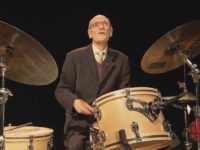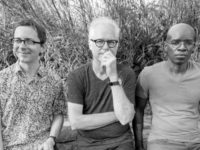It’s a reunion twenty-five years in the making. Dance Hall (Justin Time Records) is the latest set of recordings from Jerry Granelli, and puts together under his leadership again the elite guitar tandem of Robben Ford and Bill Frisell, first meeting for 1992’s A Song I Thought I Heard Buddy Sing.
Jerry Granelli — in my mind at least — holds the distinction of being one of the most interesting, imaginative drummers around while also being one of the most seasoned. He got his start in the early-mid 60s in trios led by Vince Guaraldi and Denny Zeitlin, moving on to all manners of music, from free jazz to psychedelia before finally leading his own dates in his forties. One of the ideas he mined was the use of a two-guitar attack in a jazz setting, something Ornette Coleman toyed with a decade earlier with his Prime Time band. But Granelli’s dual guitars in his UFB and V-16 bands leaned toward a harder rock edge and he often loved them to sound as one bigger instrument. The effectiveness of these ideas gets amplified when musicians the level of Frisell and Ford are involved: back then, and now.
The earlier album also featured sax boss Kenny Garrett and trombone star Julian Priester along with Anthony Cox on bass. This time, Granelli chose to pare it down to a quartet completed by his J. Anthony Granelli on bass. Half of these eight tracks are augmented by a three-man trumpet/saxes horn section formed by Derry Byrne, Steve Kaldestad and Bill Runge.
Whereas Buddy was themed around the life of Buddy Bolden, the original New Orleans jazz star from the turn of the 20th century, Dance Hall draws from songs that helped to frame Granelli’s own life. Accordingly, this is entirely a set of covers, some you’ll know quite well, some you won’t. Together though, it paints a portrait of sorts of the artist and his fealty to the blues sometimes expressed through jazz, other times through early RnB and rock ‘n’ roll and a couple of other sources that has some connection to his life.
For instance, this jazz drummer knew Bob Dylan from the young folkie’s days at the Fillmore West and chose to cover a later Dylan song, the straight-up blues “Meet Me In The Morning.” His son Anthony stays true to the original bass line (and that’s a good thing), as the elder Granelli adds spice to the gait without getting too showy about it. Indeed, even with the horn section overlaid on top, the familial rhythm section nearly steals the show from the all-world guitars because of the groove they make.
Dance Hall includes a very timely rendition of Fats Domino’s “Ain’t That A Shame,” Steven Bernstein’s horn arrangements supplying the soul and the dynamic guitar duo bringing the blues (Ford) and lyrical, folksy rhythm ‘n’ blues (Frisell). Bernstein’s charts gives the Louis Jordan jump blues “Caldonia” some big band punch, and Ford’s biting asides draws that straight line that goes from Jordan to Jimmy Hendrix.
Elsewhere, Charles Mingus’ “Boogie Stop Shuffle” is a showcase for Frisell, who has rarely cut so loose on blues soloing. “Driva Man” begins with Ford and then Frisell firing off a series of big boy licks thoughtfully punctuated by Granelli, in what is obviously an unscripted jam that precedes the jazzy blues shuffle of Max Roach’s tune. Dinah Washington’s tenderly sorrowful “This Bitter Earth” is a perfect fit for Frisell’s lush tones, as Ford knowingly completes the tonal footprint and Granelli tops it off with a sensitive cadence rendered mostly on snare and high hat.
With the sessions as before helmed by Frisell’s go-to producer Lee Townsend, Dance Hall isn’t really a Bill Frisell album in everything but name but that same lack of pretentiousness prevails over these recordings, just the quiet confidence of ‘old’ hands making old tunes renewed and fresh again. At a young seventy-six years old, Jerry Granelli still pushes forward even when his muse beckons him back.
- Ches Smith Quartet – ‘Clone Row’ (2025) - May 30, 2025
- James Brandon Lewis Quartet – ‘Abstraction Is Deliverance’ (2025) - May 27, 2025
- Soft Machine – ‘Drop’ (1971, 2025 remaster) - May 21, 2025




